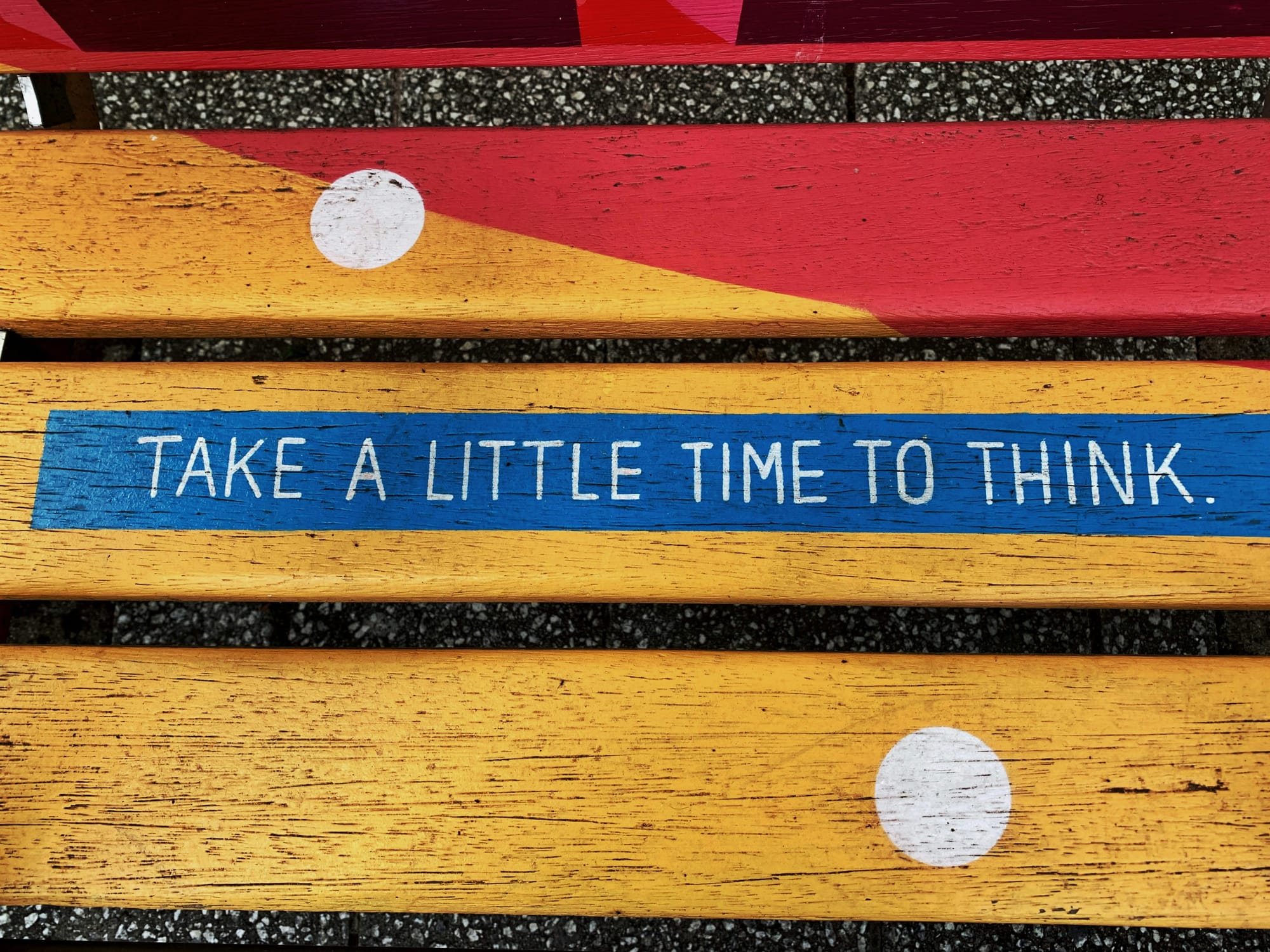Part 1: Burnout Is A Thousand Tiny Self-Betrayals
Learn how to establish safeguards against the tiny self-betrayals to help prevent and recover from burnout.

The word “burnout” has become a part of our everyday lexicon. It’s a complicated word in many ways because it covers a lot of ground: everything from describing being run down and overbusy to experiencing severe health problems and literally not being able to function normally.
Burnout has societal, cultural, and institutional contributors, which means framing burnout due to individual choices is only a slice of a much more complicated issue.
That said, I can’t solve the long-standing systemic problems any more than you can. However, there are two ways we can make a difference in our individual quest to quell burnout and contribute in a small way to the more significant issue of solving burnout culturally:
- Acknowledge and take responsibility for how our choices impact our wellness and then take intentional action to change them.
- Act as advocates in whatever capacity we can to prevent burnout and support others' recovery.
In the first part of this two-part series, I will cover strategies to help you become more conscious of your role in your burnout and recovery. In the second part, I will cover strategies to effect change for the people around you to help them prevent and recover from burnout.
A thousand tiny self-betrayals
I read somewhere that burnout results from thousands of tiny self-betrayals. Like death by a thousand cuts, it’s all the small choices we make at our own expense piling up. Just as I wrote in Why Does Burnout Happen? You Do It To Yourself, it’s all the times you:
- Said yes to something you didn’t want to do or have the capacity for
- Let your boundaries slip
- Didn’t listen to your body
- Didn’t practice self-maintenance: eat, sleep, move
- Put yourself last (or didn’t even consider yourself)
The word self-betrayal has stuck with me. Betrayal elicits a strong feeling of wrongness and consequence, where the result of burnout is not just being tired or a little run down. True burnout includes:
- Extreme fatigue
- Feelings of decreased professional ability
- General cynicism and negativity
It’s, at best, damaging and, at worst, debilitating.
You make thousands of choices every single day. Most are in the background and, individually, are relatively innocuous. However, when viewed together over time, your decisions compound and become the stepping stones on your life's various paths.
There will be times when you have to decide to push through, do things you don’t want to do, or put your needs on the back burner. The question isn’t whether those times will happen—they will! That’s a normal part of life.
What you need to pay attention to is: How often do you make choices at your own expense?
The challenge is recognizing when putting yourself last becomes your default because that nearly guarantees a spiral into burnout.
Choosing the comfort of chaos
Deep narratives embedded into North American culture normalize being exhausted and busy all the time. Many of these are narratives you were taught by your parents, who were taught by their parents, and so on. Chaos and the general busyness that permeates most people's lives can be brutal to break out of because it’s considered “normal.” It’s what everyone else is experiencing; why should you be any different?
It feels comfortable because it’s familiar.
On the flip side, there is this incredible discomfort with calm and stillness. When things are calm, you have to think about things, feel complicated feelings, and experience them. It means you have to reflect and consider where you fit in the world around you, not just endlessly move on to the next thing on your to-do list.
But we grow the most in calm and stillness. This is where space is made for creativity and new ideas, where we consider and internalize new ways of being.
- What if it was okay not to be busy all the time?
- What if it was okay to rest and not feel guilty about it?
- What if you could live a life of calm?
If burnout results from a thousand tiny self-betrayals, recovery from burnout is a thousand tiny safeguards against the comfort of chaos. These safeguards are all the choices you make to encourage calm and stillness through setting boundaries, prioritizing your health, and focusing your energy on what’s truly important to you.
Here are some strategies to establish some of those tiny safeguards. Let’s discuss each:
- Build self-awareness
- Uncover your motivators
- Reconnect to your values
- Reclaim your time

Build self-awareness
The first step to changing anything is to be aware that it’s happening and under what circumstances. It’s how you start to realize when those tiny betrayals happen. Once you start noticing something, you can interrupt the default behaviours and make different choices.
Anyone who has read my articles for any length of time will know that I am a staunch advocate of daily reflection. I mention it often and can’t recommend it enough to recognize patterns and their consequences or circumstances and their impact.
You have to take the time to notice:
- How do you feel after different activities?
- How do you feel after being around certain people?
- What words do you use to describe things?
- What thoughts run through your mind after specific interactions?
- What energizes you?
- What drains you?
- What happens in your body?
When you have the answers to these questions, you have the data you need to make different choices to implement those tiny safeguards. When you know what and who energizes you, you can prioritize them. When you know what drains you, you can plan around it. When you know the signs your body gives when it’s getting tired, you can stop before it tips into exhaustion.
Uncover your motivators
Burnout isn’t one thing. It combines motivators like perfectionism, impostor syndrome, fear, lack of boundaries, people-pleasing, or equating your productivity to your self-worth. It’s often habits and behaviours learned in childhood and adolescence that, while they worked well for a time, they are no longer serving you.
Burnout is chronic because those tiny self-betrayals, motivated by these other layers, add up over the days, months and years.
Not surprisingly, burnout can’t be solved with a vacation or new task management software (much to my clients' eternal disappointment!). There are no quick fixes or tactics that will suddenly make it go away. Recovery from and prevention of burnout requires you to uncover the layers of why you make these choices and examine your motivations.
- Are you overworking because you are afraid of looking incompetent? (Impostor syndrome)
- Are you saying yes because you are worried you won’t be liked? (People-pleasing)
- Are you adding more and more commitments because you are afraid of failing? (Perfectionism)
- Are you doing things you don’t want to do because you are uncomfortable with conflict? (Fear motivators)
There are all kinds of motivators for our tiny self-betrayals, some of which are even well-intended, but they are almost always at our expense. If you can uncover them, you can start to make different choices.
Reconnect to your values
When you have clarity on your motivators, you can take the next step to examine your values.
Burnout is more than just overwork; burnout is a disconnect from your values. It’s making choices and behaving in ways that, if done often enough and for long enough, start to do damage. When you think about what’s important to you and what you value, the tiny betrayals often betray those values.
For example,
- Working evenings and weekends all the time, even as you say, time with your family is important to you.
- Skipping meals and fitness when you say your health is a priority.
- Saying yes to things you don’t want and people-pleasing when you say you value flexibility and freedom.
Your values already exist. They are a lens through which you see the world, but they are sometimes not clearly articulated. Finding the words that represent what’s truly important to you is a building block on top of your awareness. Once you have the language to describe what matters, you can then use it as a barometer for making decisions. You can ask yourself:
Does this behaviour align with my values, or is it a tiny self-betrayal?
Articulate your values
Here is a list of values you can use as a starting point. Some of them are different words for the same general ideas. Remember that these are not what you want to value; they are not aspirational. They are what you know to be true.
Start by choosing 15, then narrow it down as far as possible. If you chose three values that most represent you, what would they be?

Reclaim your time
When you build your self-awareness, uncover your motivators, and reconnect with your values, you then have an opportunity to reclaim your time.
One of the newsletters I love, Making Time, by Sarai Mitnick, wrote,
“We are never simply given time to rest by the outside world, we have to claim it for ourselves… If we sit around waiting for someone else to give permission to meet our own needs, it won’t happen. Time is something we have to claim and organize for ourselves.”
I love the idea of claiming time. It’s active and intentional. It requires effort versus the ease with which time is so often frittered away as we navigate the daily minutia of our lives.
Consider the ways you let your time be taken from you in those tiny self-betrayals:
- When you don’t set boundaries
- When you over-commit
- When you don’t allow yourself to rest
- When you don’t take care of your body
- When you berate yourself and make yourself feel bad for (imagined) inadequacies
- When you do things that numb you (like social media scrolling) instead of things that energize or soothe you
- When you prioritize other people's needs instead of keeping space for yourself
And now, consider small ways to safeguard yourself against the tiny self-betrayals that lead to burnout. For example:
- Don’t say yes to anything immediately. Always sleep on it. “I need to check my schedule; let me get back to you.”
- Block off protected time in your calendar… and protect it!
- Set limits on how many commitments you are comfortable with each week.
- Identify hobbies or activities that feel fulfilling or relaxing.
- Add a small amount of movement to every day.
- Find an office buddy with whom you can take a break to eat lunch and be away from your desk.
- Before saying yes to anything, ask yourself if it fits in with your values.
You have to intentionally choose over and over to safeguard your time, energy and attention and remember that the tiny decisions you make each and every day add up. Make them add up to safeguards, not betrayals.
In Part 2: Our Influence On Other People's Burnout, I will discuss how you can support the people around you to help them safeguard against burnout!
There are endless ways to safeguard yourself against the thousands of tiny self-betrayals that lead to burnout. If you need help figuring out which ones will work for you, please get in touch.
Share
Ashley Janssen

Productivity consultant, writer, speaker, serial entrepreneur, chaos calmer, introvert, cat-lady. Lover of books, fitness, old fashioned’s, basketball, and video games.
Follow me on
Twitter
or
LinkedIn.
Hire me for
1 on 1 productivity consulting
or
speaking.
Related articles

Discovering The Right Way to Live

How to Develop the Skill of Asking for Help


Comments ()